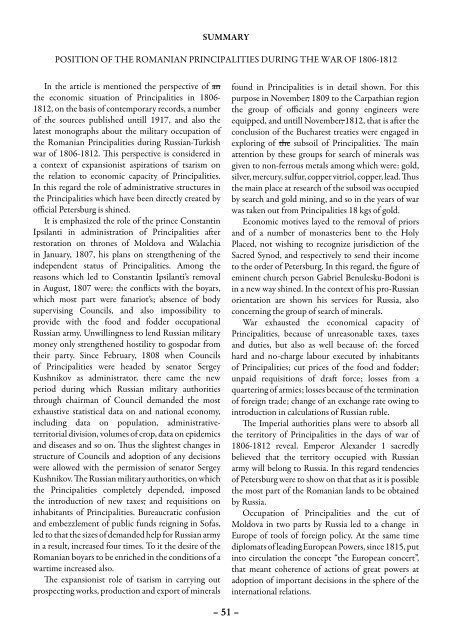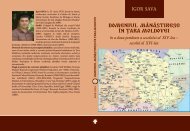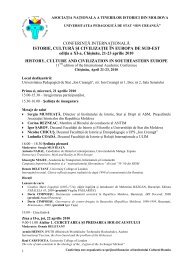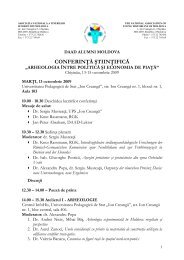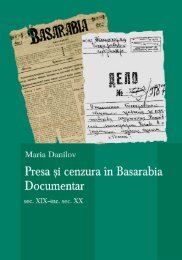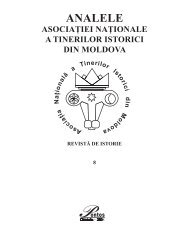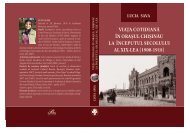aici - Asociatia Tinerilor Istorici din Moldova
aici - Asociatia Tinerilor Istorici din Moldova
aici - Asociatia Tinerilor Istorici din Moldova
You also want an ePaper? Increase the reach of your titles
YUMPU automatically turns print PDFs into web optimized ePapers that Google loves.
SUMMARY<br />
POSITION OF THE ROMANIAN PRINCIPALITIES DURING THE WAR OF 1806-1812<br />
In the article is mentioned the perspective of an<br />
the economic situation of Principalities in 1806-<br />
1812, on the basis of contemporary records, a number<br />
of the sources published untill 1917, and also the<br />
latest monographs about the military occupation of<br />
the Romanian Principalities during Russian-Turkish<br />
war of 1806-1812. This perspective is considered in<br />
a context of expansionist aspirations of tsarism on<br />
the relation to economic capacity of Principalities.<br />
In this regard the role of administrative structures in<br />
the Principalities which have been directly created by<br />
official Petersburg is shined.<br />
It is emphasized the role of the prince Constantin<br />
Іpsilanti in administration of Рrincipalities after<br />
restoration on thrones of <strong>Moldova</strong> and Walachia<br />
in January, 1807, his plans on strengthening of the<br />
independent status of Principalities. Among the<br />
reasons which led to Constantin Ipsilanti’s removal<br />
in August, 1807 were: the conflicts with the boyars,<br />
which most part were fanariot’s; absence of body<br />
supervising Councils, and also impossibility to<br />
provide with the food and fodder occupational<br />
Russian army. Unwillingness to lend Russian military<br />
money only strengthened hostility to gospodar from<br />
their party. Since February, 1808 when Councils<br />
of Principalities were headed by senator Sergey<br />
Kushnikov as administrator, there came the new<br />
period during which Russian military authorities<br />
through chairman of Council demanded the most<br />
exhaustive statistical data on and national economy,<br />
inclu<strong>din</strong>g data on population, administrativeterritorial<br />
division, volumes of crop, data on epidemics<br />
and diseases and so on. Thus the slightest changes in<br />
structure of Councils and adoption of any decisions<br />
were allowed with the permission of senator Sergey<br />
Kushnikov. The Russian military authorities, on which<br />
the Principalities completely depended, imposed<br />
the introduction of new taxes, and requisitions on<br />
inhabitants of Principalities. Bureaucratic confusion<br />
and embezzlement of public funds reigning in Sofas,<br />
led to that the sizes of demanded help for Russian army<br />
in a result, increased four times. To it the desire of the<br />
Romanian boyars to be enriched in the conditions of a<br />
wartime increased also.<br />
The expansionist role of tsarism in carrying out<br />
prospecting works, production and export of minerals<br />
found in Principalities is in detail shown. For this<br />
purpose in November, 1809 to the Carpathian region<br />
the group of officials and gonny engineers were<br />
equipped, and untill November, 1812, that is after the<br />
conclusion of the Bucharest treaties were engaged in<br />
exploring of the subsoil of Principalities. The main<br />
attention by these groups for search of minerals was<br />
given to non-ferrous metals among which were: gold,<br />
silver, mercury, sulfur, copper vitriol, copper, lead. Thus<br />
the main place at research of the subsoil was occupied<br />
by search and gold mining, and so in the years of war<br />
was taken out from Principalities 18 kgs of gold.<br />
Economic motives layed to the removal of priors<br />
and of a number of monasteries bent to the Holy<br />
Placed, not wishing to recognize jurisdiction of the<br />
Sacred Synod, and respectively to send their income<br />
to the order of Petersburg. In this regard, the figure of<br />
eminent church person Gabriel Benulesku-Bodoni is<br />
in a new way shined. In the context of his pro-Russian<br />
orientation are shown his services for Russia, also<br />
concerning the group of search of minerals.<br />
War exhausted the economical capacity of<br />
Principalities, because of unreasonable taxes, taxes<br />
and duties, but also as well because of: the forced<br />
hard and no-charge labour executed by inhabitants<br />
of Principalities; cut prices of the food and fodder;<br />
unpaid requisitions of draft force; losses from a<br />
quartering of armies; losses because of the termination<br />
of foreign trade; change of an exchange rate owing to<br />
introduction in calculations of Russian ruble.<br />
The Imperial authorities plans were to absorb all<br />
the territory of Principalities in the days of war of<br />
1806-1812 reveal. Emperor Alexander 1 sacredly<br />
believed that the territory occupied with Russian<br />
army will belong to Russia. In this regard tendencies<br />
of Petersburg were to show on that that as it is possible<br />
the most part of the Romanian lands to be obtained<br />
by Russia.<br />
Occupation of Principalities and the cut of<br />
<strong>Moldova</strong> in two parts by Russia led to a change in<br />
Europe of tools of foreign policy. At the same time<br />
diplomats of lea<strong>din</strong>g European Powers, since 1815, put<br />
into circulation the concept “the European concert”,<br />
that meant coherence of actions of great powers at<br />
adoption of important decisions in the sphere of the<br />
international relations.<br />
– 51 –


